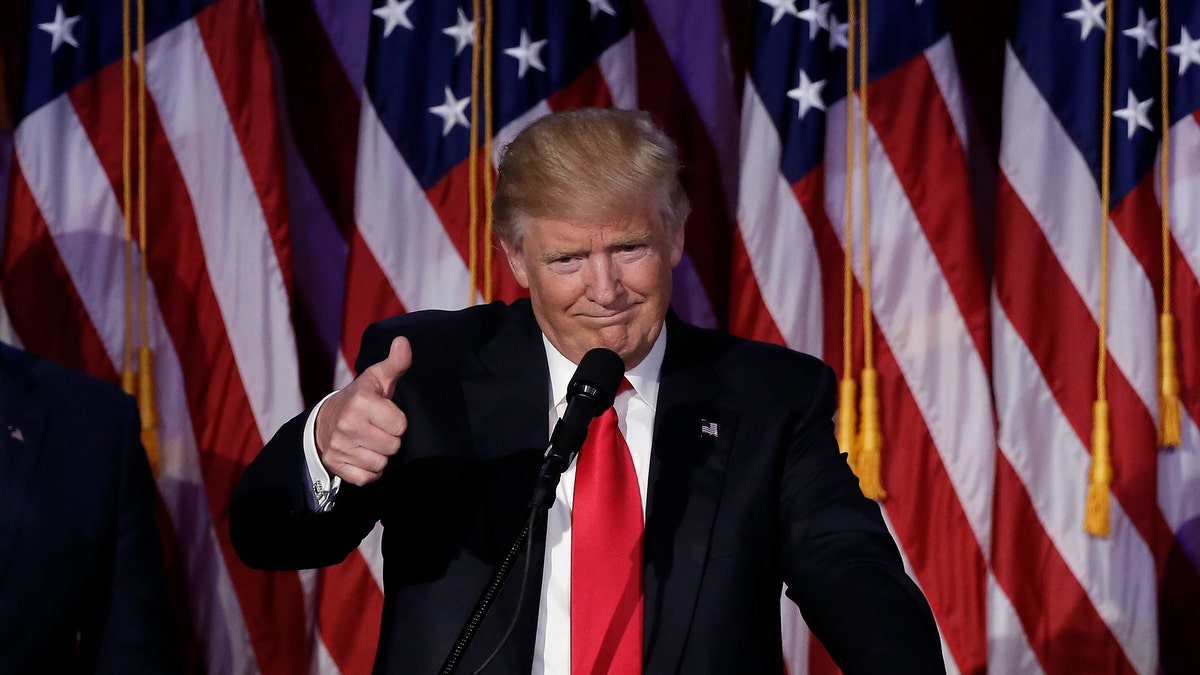
File photo - U.S. President-elect Donald Trump greets supporters during his election night rally in Manhattan, New York, U.S., November 9, 2016. (REUTERS/Mike Segar)
There is a stark reality we must face. Those Midwest jobs that went south or overseas in the past few decades are never coming back. Workers in Pennsylvania, Ohio, Indiana, Michigan, Minnesota, Iowa, Illinois and Wisconsin have been disadvantaged and marginalized by global economic forces and are struggling to return to a time of sustainable good jobs at good wages. Regardless of how much they wish it or a political bureaucracy legislates it and spends billions on job-retraining and tax credits, the post-World War 2 job culture no longer exists in these states. It is time these facts were internalized and acknowledged by these workers. It is time to create a new job culture.
Moonshots are interesting constructs. A moonshot program is a set of activities that if accomplished achieves huge payoffs to stakeholders. The first was the program to put a man on the moon which we did in July 1969. Hence the name of large, risky projects that have huge sustainable payoffs. The large technology companies such as Google have their own moonshot programs in driverless cars and artificial intelligence. DARPA has small moonshot programs to develop new products that feel unachievable and risky at first sight. There is an opportunity to create a new job culture in the Midwest that will lift its workers out of their current morass and into a culture of new business creation and wealth generation that lasts for decades. This approach will take time and money. It will take a concerted effort from population segments that have nothing in common other than we are all Americans. It requires the owners of capital on the coasts who voted Democratic to partner with high school graduates who did not or could not go to college and voted for Trump. It takes a moonshot.
The goal of this moonshot is to create tens of thousands of small businesses in the Midwest that are sustainable, profitable and provide a million net new jobs in ten years. The Midwest needs to become a center of excellence for new businesses that are formed up by its workers, grow and are either acquired by larger companies or become the next Facebook. The workers in the Midwest have the infrastructure and expertise to develop new products or services and operate new businesses. People
steeped in startups know how to take a product or service idea and monetize it. The Fortune 1000 and owners of capital in Chicago, Pittsburgh, the East Coast and the West Coast have about $2 trillion overseas that cannot be brought back because of an arcane tax system. The moonshot program brings these three elements together.
Implementation of the moonshot program will be difficult and here is one way to achieve it. First, allow the $2T to be repatriated to the U.S. in such a way that the public and private companies can use up to 5% for the moonshot program. Each company should target 1-3 counties in the Midwest and commit to creating 100 new companies each with at least 20 employees in the next 10 years in those counties. Each company should partner with people who have created startups and know how to monetize new products. VC firms and private equity firms are ideal sources of this expertise. This provides the business model generation expertise and capital necessary. What about the new products?
The level of creativity of people who live in rural areas of the U.S. to develop new products and services is highly underappreciated. If you read the media outlets, one can be forgiven for thinking that a startup is one that develops new technologies that incorporate AI with virtual reality that are done by Stanford MBAs. One of the smartest people I ever met has a high school diploma and one semester of community college before heading out into the oil fields. But he has many patents on new stethoscopes, showerheads and a facility to raise livestock naturally with an incredibly small carbon footprint. He is not an outlier.
Given that we have the three necessary ingredients for success (new product/service, monetizing new product/service, and capital), how are they brought together? There exists a natural nexus in the Midwest that can be used to house startups. There are VFW posts in each county in the Midwest states. These are multifunctional facilities and well located to serve the community of veterans. Many of those workers who are marginalized are veterans. In partnership with the VFW, capabilities like software development, additive manufacturing, testing and other necessary infrastructure for successful businesses can be co-located at VFW posts using the capital. Collaboration software would allow the local entrepreneur access to expertise from around the country on a real-time basis for product/service development, marketing and distribution. Once a business outgrows the VFW, there are plenty of empty buildings in the Midwest that can be repurposed for a growing concern.
The biggest problem with this Moonshot is the culture clash. Can a Stanford MBA who is progressive, opposes the Second Amendment and does not view the U.S. military favorably partner with a veteran who voted for Trump, is a hunter and has no college degree? That is one aspect of this Moonshot program that cannot be solved other than a commitment of the players. It is in the best interests of the progressive to generate sustainable new businesses in the Midwest and turn it into an area that creates new wealth for the public programs they seek to enlarge. It is in the best interests of the Trump voter to leverage the progressive expertise to help them generate that wealth for themselves. This partnership is necessary for the Moonshot program to work and bring prosperity back to hard hit areas.








































